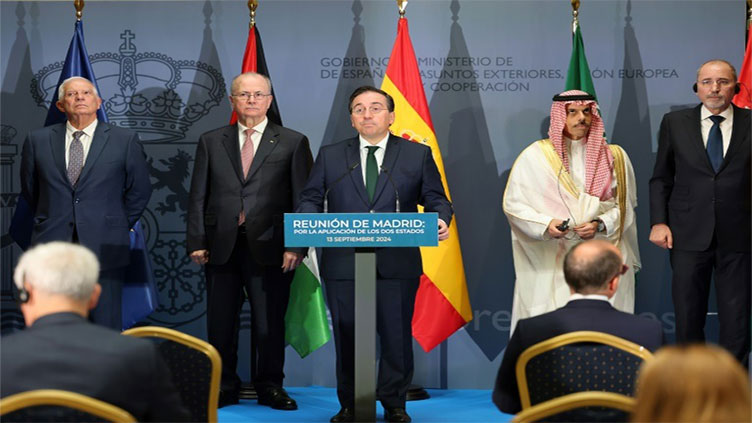Spain hosts meeting on Israel-Palestinian two-state solution

World
The implementation of the two-state solution is the only way to ensure a lasting peace in the region
MADRID (AFP) – Ministers from Muslim and European countries along with the European Union's foreign affairs chief gathered Friday in Madrid to discuss how to advance a two-state solution to the Israeli-Palestinian conflict.
"Together, we want to identify the concrete actions that will enable us to make progress towards this objective," Spanish Prime Minister Pedro Sanchez wrote on social network X.
"The international community must take a decisive step towards a just and lasting peace in the Middle East," the Socialist premier added.
Sanchez welcomed participants at his official residence before the start of the meeting at the foreign ministry in central Madrid, hosted by his top diplomat Jose Manuel Albares.
"The implementation of the two-state solution is the only way to ensure a just and lasting peace in the region through the peaceful and secure coexistence of the state of Palestine and the state of Israel," Albares told a news conference.
In attendance were Palestinian Prime Minister Mohammad Mustafa and the foreign ministers of Egypt, Jordan, Qatar, Saudi Arabia and Turkey -- all members of the Arab-Islamic Contact Group for Gaza -- as well as the heads of the Arab League and the Organisation of Islamic Cooperation.
The European Union was represented by its foreign affairs chief Josep Borrell as well as the foreign ministers of Ireland, Norway and Slovenia in addition to Spain.
EU nations have "different positions" on whether to recognise Palestine as a state "but there is undoubtedly unanimity in the union on the need to support the solution based on the construction of the Palestinian state, because the state of Israel already exists," Borrell told a separate press conference after the end of the meeting.
Israeli Foreign Minister Israel Katz blasted Borrell for taking part in the gathering, writing on social network X that "Borrell supports establishing a Palestinian terror state controlled by Iran, and the axis of evil against Israel, moderate Arab states, and Europe."
"This is Borrell's legacy –- anti-Semitism and hatred towards Israel," he added.
'TRAGIC DIMENSION'
Asked about Katz's comments, Borrell said that "accusing those who disagree with a government's position of anti-Semitism makes no sense."
"There have unfortunately been examples in history of what it means to be anti-Semitic, and I don't think we should play with big words that have had a tragic dimension in history," he added.
Calls for a two-state solution have grown since the outbreak of the war in Gaza, which began with Hamas's October 7 attack on Israel.
That attack resulted in the deaths of 1,205 people, mostly civilians, according to an AFP tally based on Israeli figures.
The militants also seized 251 hostages, 97 of whom are still in Gaza, including 33 the Israeli military says are dead.
Israel has responded with an offensive that has killed at least 41,118 people in Gaza, according to the health ministry in the Hamas-run territory. The UN rights office says most of the dead are women and children.
Sanchez has been one of the staunchest critics in Europe of Israel's Gaza offensive since the start of the conflict.
Under his watch, Spain on May 28 along with Ireland and Norway formally recognised a Palestinian state comprising the Gaza Strip and the West Bank.
Earlier this month he announced that the first "bilateral summit between Spain and Palestine" would be held before the end of the year. He said he expected "several collaboration agreements between the two states" to be signed.


